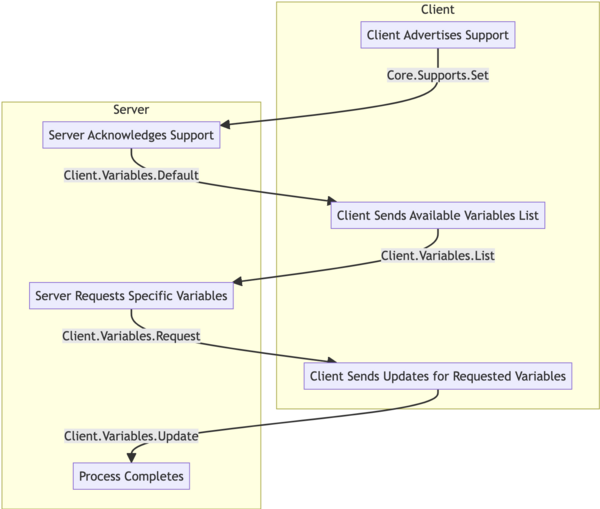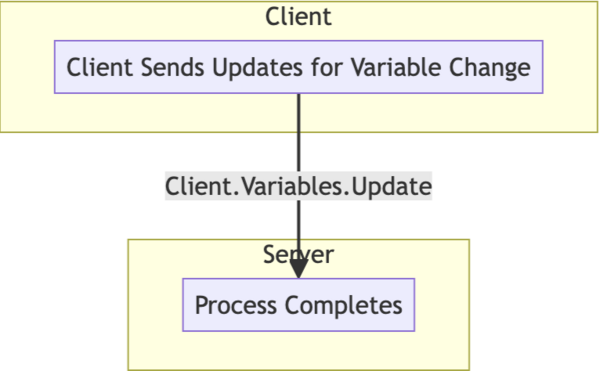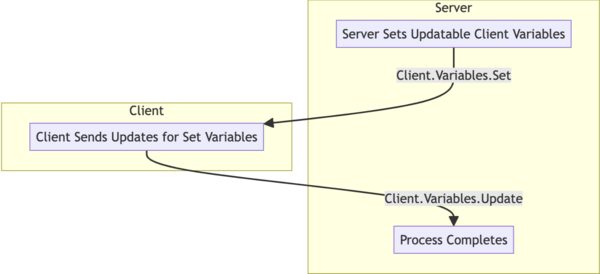Difference between revisions of "Standards:GMCP Client Variables"
m (Initial Draft) |
m (Initial Draft) |
||
| Line 162: | Line 162: | ||
*'''Server Acknowledgement''': Servers acknowledge support with Client.Variables.Default. | *'''Server Acknowledgement''': Servers acknowledge support with Client.Variables.Default. | ||
*'''Consent Management''': Clients must handle user consent for sharing sensitive variables. Prompts should inform users of requested data and allow them to opt-in or block requests. | *'''Consent Management''': Clients must handle user consent for sharing sensitive variables. Prompts should inform users of requested data and allow them to opt-in or block requests. | ||
| + | *'''Blocked Variables''': Clients should not share a variable previously blocked by a user in Client.Variables.List messages, nor made available to other protocols, such as NEW-ENVIRON, MNES, MTTS. | ||
*'''Variable Updates''': Clients should manage variable updates efficiently, ensuring data integrity and user consent. | *'''Variable Updates''': Clients should manage variable updates efficiently, ensuring data integrity and user consent. | ||
*'''Variable Naming Convention''': Variables should be transferred in uppercase to maintain consistency and avoid issues with case sensitivity. | *'''Variable Naming Convention''': Variables should be transferred in uppercase to maintain consistency and avoid issues with case sensitivity. | ||
| Line 175: | Line 176: | ||
Client.Variables.Default {} | Client.Variables.Default {} | ||
</syntaxhighlight> | </syntaxhighlight> | ||
| − | 3. '''Client''': Must | + | 3. '''Client''': Must send available variables list. Variables previously blocked by the user should not be sent. |
<syntaxhighlight lang="json"> | <syntaxhighlight lang="json"> | ||
Client.Variables.List { | Client.Variables.List { | ||
Revision as of 02:54, 4 August 2024
GMCP Client Variables Sharing Standard
Overview and Rationale
The GMCP Client Variables Sharing extension provides a standardized way to exchange client-specific variables between MUD clients and game servers using GMCP messages. This facilitates enhanced user experiences by allowing servers to adjust gameplay and UI elements based on client-provided data.
Rationale
As MUDs become more complex, the need for customizable and dynamic interactions between clients and servers has grown. Sharing client-specific variables allows for personalized gameplay experiences, seamless UI adjustments, and improved accessibility features. By standardizing this exchange, the GMCP Client Variables Sharing extension ensures that all participants in the MUD ecosystem can benefit from enhanced communication and data sharing.
Consent Management Process
A critical aspect of sharing client-specific variables is obtaining user consent. This process ensures that users are aware of what data is being shared and have control over their personal information.
Specification for Client.Variables
Commands
Client.Variables.Default
Purpose: Sent by the server to acknowledge support for the Client.Variables namespace. The client will synchronously respond with a Client.Variables.List message.
Client.Variables.Default {}Client.Variables.List
Purpose: The client sends a list of available client variables and their attributes. The server may asynchronously respond with a Client.Variables.Request message.
Client.Variables.List {
“256_COLORS”: {“available”: true, “updatable”: false},
“ANSI”: {“available”: true, “updatable”: false},
“BOLD_IS_BRIGHT”: {“available”: true, “updatable”: true},
“CHARSET”: {“available”: true, “updatable”: true},
“CLIENT_NAME”: {“available”: true, “updatable”: false},
“CLIENT_VERSION”: {“available”: true, “updatable”: false},
“FONT”: {“available”: false, “updatable”: false},
“FONT_SIZE”: {“available”: false, “updatable”: false},
“LANGUAGE”: {“available”: false, “updatable”: false},
“MTTS”: {“available”: true, “updatable”: false},
“OSC_COLOR_PALETTE”: {“available”: true, “updatable”: false},
“SCREEN_READER”: {“available”: false, “updatable”: false},
“SYSTEMTYPE”: {“available”: false, “updatable”: false},
“TERMINAL_TYPE”: {“available”: true, “updatable”: false},
“TLS”: {“available”: true, “updatable”: false},
“TRUECOLOR”: {“available”: true, “updatable”: false},
“USER”: {“available”: false, “updatable”: false},
“UTF-8”: {“available”: true, “updatable”: false},
“VT100”: {“available”: true, “updatable”: false},
“WORD_WRAP”: {“available”: true, “updatable”: false}
}Attribute Details
| Attribute | Description |
|---|---|
| available | Indicates if the variable is available for use. |
| updatable | Indicates if the variable can be updated by the server. |
Client.Variables.Request
Purpose: The server requests specific client variables. The client will synchronously respond with a Client.Variables.Update message.
Client.Variables.Request [“BOLD_IS_BRIGHT”, “CHARSET”, “FONT”, “FONT_SIZE”, “LANGUAGE”, “SCREEN_READER”, “SYSTEMTYPE”, “USER”]Client.Variables.Update
Purpose: The client sends updates for requested variables with a source attribute of request.
Client.Variables.Update {
“BOLD_IS_BRIGHT”: {
“available”: true,
“updatable”: true,
“requested”: false,
“source”: “request”,
“timestamp”: 1721495879,
“value”: 2
},
“CHARSET”: {
“available”: true,
“updatable”: true,
“requested”: false,
“source”: “request”,
“timestamp”: 1721495879,
“value”: “UTF-8”
},
“FONT”: {
“available”: false,
“updatable”: false,
“requested”: true,
“source”: “request”,
“timestamp”: 1721495879
},
“FONT_SIZE”: {
“available”: false,
“updatable”: false,
“requested”: true,
“source”: “request”,
“timestamp”: 1721495879
},
“LANGUAGE”: {
“available”: false,
“updatable”: false,
“requested”: true,
“source”: “request”,
“timestamp”: 1721495879
},
“SCREEN_READER”: {
“available”: false,
“updatable”: false,
“requested”: true,
“source”: “request”,
“timestamp”: 1721495879
},
“SYSTEMTYPE”: {
“available”: false,
“updatable”: false,
“requested”: true,
“source”: “request”,
“timestamp”: 1721495879
},
“USER”: {
“available”: false,
“updatable”: false,
“requested”: true,
“source”: “request”,
“timestamp”: 1721495879
}
}Attribute Details
| Attribute | Description |
|---|---|
| available | Indicates if the variable is available for use. |
| updatable | Indicates if the variable can be updated by the server. |
| requested | Indicates if the variable was requested by the server. |
| source | Indicates the source of the update (request, server, client). |
| timestamp | Unix timestamp indicating when the update was made. |
| value | The value of the variable. |
Client.Variables.Set
Purpose: The server sets one or more updatable client variables. The client will synchronously respond with a Client.Variables.Update with a source attribute of server.
Client.Variables.Set {
“BOLD_IS_BRIGHT” : “1”,
"CHARSET" : "UTF-8"
}Implementation Considerations
- Client Support Advertisement: Clients should advertise their support for the Client.Variables namespace using Core.Supports.Set.
- Server Acknowledgement: Servers acknowledge support with Client.Variables.Default.
- Consent Management: Clients must handle user consent for sharing sensitive variables. Prompts should inform users of requested data and allow them to opt-in or block requests.
- Blocked Variables: Clients should not share a variable previously blocked by a user in Client.Variables.List messages, nor made available to other protocols, such as NEW-ENVIRON, MNES, MTTS.
- Variable Updates: Clients should manage variable updates efficiently, ensuring data integrity and user consent.
- Variable Naming Convention: Variables should be transferred in uppercase to maintain consistency and avoid issues with case sensitivity.
Example Flow
1. Client: Should advertise support.
Core.Supports.Set ["Client.Variables 1", ...]2. Server: May acknowledge support.
Client.Variables.Default {}3. Client: Must send available variables list. Variables previously blocked by the user should not be sent.
Client.Variables.List {
"256_COLORS": {"available": true, "updatable": false},
"ANSI": {"available": true, "updatable": false},
"BOLD_IS_BRIGHT": {"available": true, "updatable": true},
"CHARSET": {"available": true, "updatable": true},
"CLIENT_NAME": {"available": true, "updatable": false},
"CLIENT_VERSION": {"available": true, "updatable": false},
"FONT": {"available": false, "updatable": false},
"FONT_SIZE": {"available": false, "updatable": false},
"LANGUAGE": {"available": false, "updatable": false},
"MTTS": {"available": true, "updatable": false},
"OSC_COLOR_PALETTE": {"available": true, "updatable": false},
"SCREEN_READER": {"available": false, "updatable": false},
"SYSTEMTYPE": {"available": false, "updatable": false},
"TERMINAL_TYPE": {"available": true, "updatable": false},
"TLS": {"available": true, "updatable": false},
"TRUECOLOR": {"available": true, "updatable": false},
"USER": {"available": false, "updatable": false},
"UTF-8": {"available": true, "updatable": false},
"VT100": {"available": true, "updatable": false},
"WORD_WRAP": {"available": true, "updatable": false}
}4. Server: May requests specific variables.
- The client may prompt the user once per connected session for variables that are
"available": false. - The client must track variables requested for the current connected session to limit prompting requests for sharing to once per connected session.
Client.Variables.Request ["BOLD_IS_BRIGHT", "CHARSET", "FONT", "FONT_SIZE", "LANGUAGE", "SCREEN_READER", "SYSTEMTYPE", "USER"]5. Client: Updates requested variables.
Client.Variables.Update {
"BOLD_IS_BRIGHT": {
"available": true,
"updatable": true,
"requested": false,
"source": "request",
"timestamp": 1721495879,
"value": 2
},
"CHARSET": {
"available": true,
"updatable": true,
"requested": false,
"source": "request",
"timestamp": 1721495879,
"value": "UTF-8"
},
"FONT": {
"available": false,
"updatable": false,
"requested": true,
"source": "request",
"timestamp": 1721495879
},
"FONT_SIZE": {
"available": false,
"updatable": false,
"requested": true,
"source": "request",
"timestamp": 1721495879
},
"LANGUAGE": {
"available": false,
"updatable": false,
"requested": true,
"source": "request",
"timestamp": 1721495879
},
"SCREEN_READER": {
"available": false,
"updatable": false,
"requested": true,
"source": "request",
"timestamp": 1721495879
},
"SYSTEMTYPE": {
"available": false,
"updatable": false,
"requested": true,
"source": "request",
"timestamp": 1721495879
},
"USER": {
"available": false,
"updatable": false,
"requested": true,
"source": "request",
"timestamp": 1721495879
}
}Flow Diagrams
Requesting and Receiving Variables
Receiving Variable Updates
Setting Updatable Variables
Conclusion
The GMCP Variables Sharing extension standardizes the exchange of client-specific variables, ensuring seamless integration and enhanced user experiences. By adopting this standard, MUD developers can streamline variable management, improve client-server communication, and provide more personalized gaming experiences.
Versions
- Version 1.0: Initial specification.
Authors
- Mike Conley (Tamarindo, Administrator at StickMUD and Mudlet contributor) mike.conley[at]stickmud.com
Notes
- This specification is subject to updates and community input. Contributions and feedback are welcome to ensure it meets the needs of the MUD community.
- Implementation should follow GMCP protocol specifications, and all messages must be well-formatted JSON objects.


